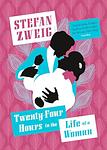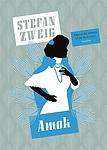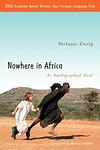Stefan Zweig
Stefan Zweig was an Austrian novelist, playwright, journalist, and biographer. Born on November 28, 1881, in Vienna, he became one of the most popular and widely translated writers of the early 20th century. Zweig was known for his humanist themes and keen psychological insight. His notable works include 'Beware of Pity', 'The World of Yesterday', and 'Chess Story'. He fled Austria due to the rise of Nazism and lived in exile in various countries. Tragically, he and his wife committed suicide in Brazil in 1942.
Books
This list of books are ONLY the books that have been ranked on the lists that are aggregated on this site. This is not a comprehensive list of all books by this author.
-
1. The Royal Game
"The Royal Game" is a gripping novella about a man who, while in solitary confinement by the Nazis, steals a book of past chess games and plays them all in his mind to keep his sanity. Once freed, he becomes a chess master but his mental state is fragile. On a cruise ship, he is challenged to a game by the reigning world champion, leading to a psychological battle that pushes him to the brink of madness.
-
2. Twenty Four Hours In The Life Of A Woman
The novella delves into the intense emotional landscape of a middle-aged English widow who, while staying at a Riviera resort, becomes deeply fascinated by the plight of a young man consumed by a gambling addiction. Over the course of a day, their lives intertwine, leading her to reflect on the nature of obsession and the fleeting moments of passion that can irrevocably alter one's life. As she recounts her own story of moral and emotional upheaval, the narrative explores themes of societal expectations, personal liberation, and the profound impact of ephemeral encounters.
-
3. Confusion
"Confusion" is a compelling narrative that explores the intense and passionate relationship between a student and his charismatic professor. Set in the early 20th century, the story unfolds as the protagonist becomes entangled in the professor's personal life, discovering his mentor's secret past, his struggling marriage, and his hidden homosexual desires. The book presents a profound exploration of human emotions, identity, and the complexities of love, against the backdrop of the societal norms of the time.
-
4. Beware Of Pity
The novel explores the complex emotions and consequences that arise when a young lieutenant, succumbing to societal pressure, feigns romantic interest in a disabled young woman. His pity-driven actions lead to an entanglement of obligation, guilt, and false hope, ultimately culminating in a tragic series of events. Set against the backdrop of the Austro-Hungarian Empire on the brink of World War I, the story delves into the psychological depths of its characters, examining the moral dilemmas and the devastating impact of pity when it is mistaken for love.
-
5. Amok
"Amok" is a novella that delves into the mind of a European doctor, who, while working in the Dutch East Indies, becomes obsessed with a wealthy and married female patient. The doctor's fixation spirals into a dangerous and self-destructive passion after she asks him to perform an illegal abortion. The story is a psychological exploration of obsession, guilt, and moral boundaries, told through the doctor's confession to a stranger during a ship journey.
-
6. Balzac
This book offers a comprehensive biography of the famed French novelist and playwright, Honore de Balzac. The author delves deep into Balzac's life, exploring both his personal and professional experiences. The narrative sheds light on Balzac's tumultuous relationships, his relentless work ethic, and his extraordinary ability to depict the society and people of his time through his literature. Balzac's passion, determination, and genius are vividly presented, giving readers an intimate understanding of the man behind some of the most influential works in French literature.
-
7. The World Of Yesterday
The book is a poignant memoir reflecting on the transformative events and cultural atmosphere of Europe before World War I, through the interwar years and into the rise of the Nazis. It captures the author's experiences of growing up in a vibrant pre-war Vienna, the intellectual richness and artistic achievements of the time, as well as the profound sense of loss as the world he knew disintegrated into chaos and totalitarianism. With a mix of nostalgia and despair, the narrative serves as a lament for the lost world of European culture and as a warning about the fragility of peace and the human cost of war.
-
8. Nowhere In Africa
"Nowhere in Africa" is not a book by Stefan Zweig, but rather a novel by Stefanie Zweig. It is an autobiographical narrative that tells the story of a Jewish family who flees Nazi Germany in the 1930s to find refuge in Kenya. The story explores their struggles and adjustments to a vastly different life on an African farm, dealing with the challenges of displacement, cultural adaptation, and the complexities of maintaining their identity amidst the backdrop of World War II. The novel delves into themes of exile, belonging, and resilience as the family navigates their new reality while yearning for the home they left behind.







